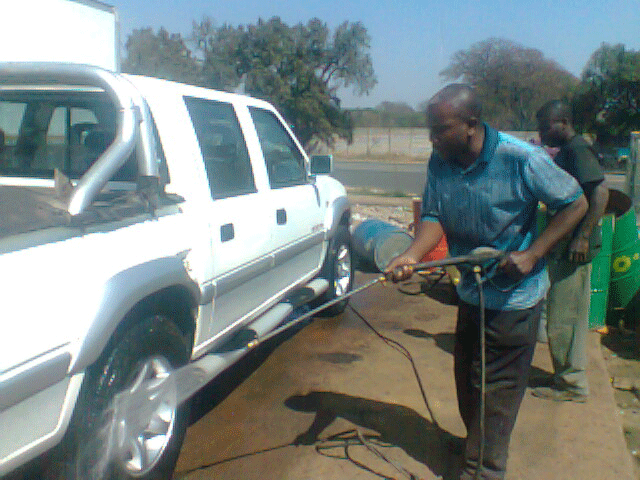
HARARE — Hundreds of unemployed men and youths have turned to street car-washing to earn a living in most suburbs in the capital city.REPORT BY MOSES CHIBAYA Some of the youths are holders of higher national diplomas from reputable institutions but cannot find jobs in the country, where the unemployment rate tops 80%.
Youths who spoke to Standardcommunity last week said they had resorted to the car-washing business after failing to get employment in the formal market.
The vehicle cleaners are found in every high-density suburb in Harare, and in the city centre.
The youths charge between US$2 and US$10, depending on their location and the type of vehicle being cleaned.
Chris Moyo, who operates near Mushandirapamwe Hotel at Machipisa Shopping Centre, said most people now appreciated their work because they were earning a living through honest means. “You can do big things through car-washing, discipline is the only thing that is needed,” said Moyo. “Of course we have certain disadvantages, for example it’s difficult to acquire a bank loan or benefits like medical aid, but we are earning a better life than most workers.”
The youths take home between US$15 and US$40 per day, depending on where they operate from, meaning that some make close to US$1 000 per month. They however, get much more during weekends.
“Some of us here are educated but it’s only that life is difficult so for those that think we are street fathers, we are not,” said Moyo. “l get at least US$20 per day and from that I can earn a living. A lot of families are surviving through this.”
Another youth, who identified himself only as Tendai and operates at an open space after the vehicle inspection department (VID) along Robert Mugabe Street, said most people thought they were “street fathers” but they were genuine business people fending for their families through honest means.
- Chamisa under fire over US$120K donation
- Mavhunga puts DeMbare into Chibuku quarterfinals
- Pension funds bet on Cabora Bassa oilfields
- Councils defy govt fire tender directive
Keep Reading
“I have bigger plans. I hope this car-washing business is going to enable me to invest in other projects that can generate more money for me.”
He encouraged other youths to venture into projects that could generate cash.
“I want to encourage other youths not to be idle because that is when they turn to crimes like drug abuse and stealing. God will always bless the work of your hands,” he said.
Job-creation has lagged behind, says Robertson
Asked to share his views on the youths’ business venture, renowned economist John Robertson said more people were joining the informal sector as the employment rate continued to go down.
“The estimated total workforce today is down to the number employed in 1970. And since 1970, the population has more than doubled. About 300 000 young people reach the age of 18 every year and offer themselves to the labour market,” said Robertson.
“The cost of creating a single job is usually of the order of thousands of dollars, and as very few formal jobs have been created in the past 10 years, we have millions of young people still out of work.” He added: “We need to invest a billion dollars a year just to keep up with the new entrants, but clearing the backlog will call for very much more. As the money to fund such growth is not in the country, Zimbabwe has to attract investment inflows from abroad.”
Robertson said although the youths could make a living through car-washing, they would always remain poor.
“Informal jobs are less expensive to create, so the car-washing, vending and offers of various services you mention can help people survive in difficult times, but they will always remain poor and extremely vulnerable to very dangerous influences and conditions,” he said.
He added: “They will contribute no tax revenues to the state or the municipalities, they will probably involve themselves in illegal, immoral or life-threatening activities.











